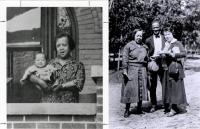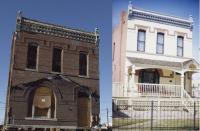Written and researched by Xvante F.
A medical trailblazer, and known to her patients as “the baby doctor” Justina Ford strongly affected Denver, Five Points, with an attentive heart, skilled hands and a mothering mind. She was determined to do whatever she could to take care of her patients no matter who they were. She took in people who could not afford to go to the hospitals or were turned away. Immigrants, black-americans and poor white people came to her for help and received what they couldn't receive elsewhere. Whether it was late house calls or buying extra groceries, she made sure she was available to her patients.
Justina graduated from Galesburg high school, an integrated high school in Illinois, in 1890. She attended Hering Medical School in Chicago to earn her osteopathy training. While attending, she met her soon to be husband, Reverend John L. Ford. Justina graduated, a few years after she married Rev. Ford, in 1899. The couple moved to Alabama shortly after Justina graduated but the unwelcoming atmosphere provoked them to move to Denver in 1902. Justina Ford became one of the first licensed female doctors, and the very first black-american doctor, not only in Denver, Colorado, but the U.S. as well, under license number 3800.
On October 2nd, 1902, Justina Ford went to pay for her license, the examiner told her “I'd feel dishonest taking a fee from you. You've got two strikes against you. First of all you're a lady and second you're colored.” Justina was unable to get medical privileges to practice in any of the Denver hospitals, since all the medical societies turned her down. Instead John and Justina bought a two story brick house in the Five Points neighborhood so Justina could practice medicine. A wide variety of people sought out help from Justina and formed bonds with her that lasted years after their care and her death. Justina delivered over 7,000 babies during her medical career and some patients still refer to themselves as part of the “Justina Baby Club”.
Dr. Ford helped patients until her illness, which led to her death on October 14, 1952. She died at the age of eighty-one. Two years before she died, the Denver Medical Society and the Colorado Medical Society admitted Dr. Ford and Denver's Cosmopolitan Club awarded her its human relations award in 1950. Many associations honored Dr. Ford's work after she died, the University of Colorado established the Justina Ford Medical Society and a scholarship in her name, The Warren library in northeast Denver was renamed the Ford-Warren Branch Library in her honor. I was able to visit the Denver Public Library branch and take a picture of the amazing portrait of her. In 1984 Historic Denver and Paul Stewart saved Dr. Ford's home from demolition and moved it to California Street. It now houses the Black American West Museum of Heritage Center. Local artist Jess E. DuBois later created a bronze statue of Dr. Justina Ford at the Denver light rail station. In 1985 Dr. Ford was inducted into the Colorado Women's Hall of Fame. If you would like to watch a documentary on this medical pioneer, PBS created one that you can watch on youtube, search the Colorado Experience: Justina Ford.
Dr. Justina Ford knew what she wanted to do with her life and committed herself to it. She was introduced to the medical profession at a young age through her mother. I believe she carried those experiences of helping her mom with her throughout her life, helping whomever showed up at her door, however she could. She's a leader with a heart of gold!

